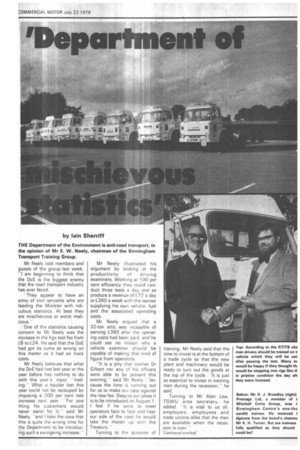by lain Sherriff
Page 71

If you've noticed an error in this article please click here to report it so we can fix it.
THE Department of the Environment is anti-road transport, in the opinion of Mr E. W. Neely, chairman of the Birmingham Transport Training Group.
Mr Neely told members and guests of the group last week: "I am beginning to think that the DoE is the biggest enemy that the road transport industry has ever faced.
"They appear to have an army of civil servants who are feeding the Minister with ridiculous statistics. At best they are mischievous at worst malicious."
One of the statistics causing concern to Mr Neely was the increase in the hgv test fee from E:13 to E24. He said that the DoE had got its sums as wrong on this matter as it had on track costs.
Mr Neely believes that what the DoE had lost last year or the year before has nothing to do with this year s Input "trading." What a haulier lost this year could not be recouped by imposing a 200 per cent rate increase next year. "For one thing his customers would never stand for it," said Mr Neely, "and I take the view that this is cpite the wrong time for the Department to be introducing such a swingeing increase."' Mr Neely illustrated his argument by looking at the productivity of driving examiners. Working at 100 per cent efficiency they could conduct three tests a day and so produce a revenue of £72 a day or i'.360 a week with the learner supplying his own vehicle, fuel and the associated operating costs.
Mr Neely argued that a 32-ton artic was incapable of earning £360 after the operating costs had been paid, and he could see no reason why a vehicle examiner should be capable of making that kind of figure from operators.
"It is a pity that neither Dr Gilbert nor any of his officers were able to be present this evening," said Mr Neely, "'because the time is running out for us to make our case against the new fee. Despite our pleas it is to be introduced on August 1. I feel if he were to meet operators face to face and hear our side of the case he would take the matter up with the Treasury.
Turning to the question of training, Mr Neely said that the time to invest is at the bottom of a trade cycle so that the new plant and machinery would be ready to turn out the goods at the top of the cycle. "It is just as essential to invest in training men during the recession," he said.
Turning to Mr Alan Law, TGWU area secretary,. he added ''It is vital to us all, employers, employees and trade unions alike that the men are available when the recession is over."
Continued overleaf
















































































































